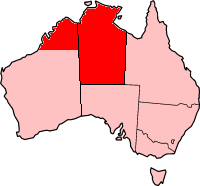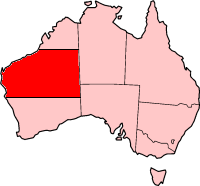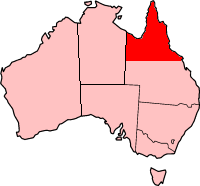Regional Force Surveillance Units facts for kids
The Regional Force Surveillance Units (RFSUs) are special army groups in the Australian Army Reserve. Their main job is to patrol and watch over the huge, remote areas of northern Australia. These units are made up mostly of part-time soldiers called Reservists. These Reservists often live in the very areas they patrol.
All the RFSUs together form the Regional Force Surveillance Group. This group is led by a Colonel and is based at the 2nd Division Headquarters in Sydney. Even during peaceful times, the RFSUs are always on duty, doing real patrols with important goals.
There are currently three main RFSUs, each like a small army battalion:
- North-West Mobile Force (NORFORCE) looks after the Northern Territory and the Kimberley region of Western Australia.
- The Pilbara Regiment covers the Pilbara region in Western Australia.
- 51st Battalion, Far North Queensland Regiment is responsible for North Queensland.
What the RFSUs Do
The RFSUs are very special and different from most other Australian Army units. Their main job is to conduct long-distance patrols to watch and gather information in the quiet, far-off parts of northern Australia. They are always ready for action, doing real missions even when there isn't a war.
The main reason for the RFSUs is to help protect Australia by keeping an eye on remote areas. But their work also gives useful information to other groups. This includes Australian Customs, state and federal police, and intelligence agencies.
Before the RFSUs existed, the Special Air Service Regiment (SASR) did this surveillance work. The SASR soldiers were very good at watching and gathering information. However, in the late 1970s and early 1980s, the SASR also started focusing on fighting terrorism. This meant they needed help to keep patrolling northern Australia while also doing their new jobs.
So, the idea was to create new units to take over the SASR's watching tasks in northern Australia. The RFSUs get training support from the SASR. This means they use similar small-group tactics. Soldiers from both units sometimes swap places to share skills. However, the RFSUs are also led by soldiers from the Royal Australian Regiment. The RFSUs are unique because they can focus on long-term, widespread operations in remote Australia.
Every patrol mission is different. RFSU patrols plan carefully for each task. Sometimes, a patrol might arrive by a small boat at night, hide their boats, do their job, and then leave the same way. Other times, they might be flown in by helicopter or small plane. Or they might drive in, hide their vehicles, or even jump out of a moving vehicle and disappear into the bush.
To be successful, RFSU patrols must not be seen or heard. So, skills like camouflage and hiding are very important for these soldiers. If there were ever a small or large attack in the north, the RFSUs would find enemy landings. They would especially watch areas near important economic and defence sites.
In the very unlikely event of an invasion of northern Australia, the RFSUs would stay hidden behind enemy lines. These patrols would need to find food from the land to survive and complete their mission. They would be the first line of defence for Australia. Their tasks would include reporting enemy movements, calling in airstrikes, and stopping the enemy's progress. They would also try to disrupt enemy supply lines for as long as possible.
How the RFSUs Started
The idea for the RFSUs came from a unit formed during the Second World War. This unit was called the 2/1st North Australia Observer Unit. They patrolled northern Australia on horses and in vehicles. Their goal was to watch and report on enemy movements on land, sea, and in the air. These patrols happened in very tough conditions, with little support. So, the soldiers needed to be very clever, independent, and determined.
After Australia pulled its troops out of Vietnam, the country's defence plan changed. Instead of defending far away, the focus became defending Australia itself. Because of this, the Australian military started looking for new ways to patrol the long coastline. In the late 1970s, the Special Air Service Regiment did some tests in northern Western Australia. These tests showed that small patrols, like SAS patrols, could be very useful for watching the long, empty coastline.
After these tests, it was decided in the early 1980s to create three Regional Force Surveillance Units in northern Australia. These units would be staffed by Army Reservists. It was hoped that these local Reservists would use their knowledge of the area to make the patrols more effective. Each RFSU was created by growing and renaming an existing independent rifle company:
- NORFORCE was formed on 1 July 1981.
- The Pilbara Regiment was formed on 26 January 1985.
- 51st Battalion, Far North Queensland Regiment was formed on 1 October 1987.
Since they were created, the RFSUs have been very successful. They have greatly helped keep northern Australia safe. All three RFSUs send patrols to Operation Resolute. This is the Australian Defence Force's effort to patrol Australia's waters and coastline.
The RFSUs became part of the 6th Brigade in 2010. Then, in 2014, they moved to the 2nd Division. By the end of 2014, the RFSUs had about 200 full-time and 1,350 part-time soldiers. On 4 October 2018, all three RFSUs were brought together under a new main group called the Regional Force Surveillance Group. This new group officially started at a ceremony in Darwin.
Indigenous Australians and the RFSUs
Historically, these units continue a long tradition in Australia of using Aboriginal trackers. Indigenous skills in tracking, finding paths, and surviving in the outback have a proud history. They have helped law enforcement and military operations for a long time.
Since RFSUs are Army Reserve units, their soldiers often reflect the people living in their patrol areas. Because of this, a large number of RFSU soldiers are Indigenous Australians. This makes the Australian Army one of the biggest employers of Indigenous Australians. NORFORCE has the most Indigenous soldiers, with 60% of its unit being Indigenous.
About 30% of 51 FNQR's soldiers are Torres Strait Islanders or other Indigenous Australians. The Pilbara Regiment has fewer Indigenous soldiers. Many Indigenous community leaders think highly of the RFSUs. This is because the units offer jobs and training to young Indigenous people in remote communities.
See also
- Northern Command (Australia)
- Canadian Rangers
 | John T. Biggers |
 | Thomas Blackshear |
 | Mark Bradford |
 | Beverly Buchanan |




